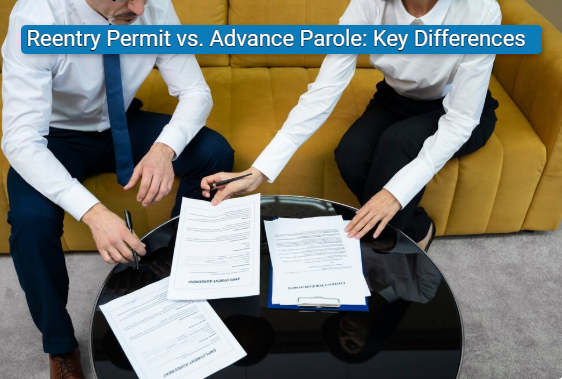Reentry Permit vs Advance Parole: What You Need to Know
Let’s be honest: immigration forms and rules can feel like a different language. If you’re planning to leave the U.S. for any reason — whether it’s family, work, or something urgent — the last thing you want is to make a travel mistake that jeopardizes your green card or your future here.
One of the most common questions I hear from people is:
Should I apply for a reentry permit or advance parole?
The answer depends entirely on your immigration status and your plans. In this guide, I’ll walk you through everything you need to know in detail.
What Are We Talking About?
When we talk about the travel document form I-131, we’re referring to one government form, but with different purposes, depending on what you’re applying for. Whether you’re applying for a re-entry permit, advance parole document, or a refugee travel document, it all starts with Form I-131.
But knowing which one applies to you is what matters most. Here’s how to figure it out.
What Is a Reentry Permit?

If you’re a green card holder and you plan to leave the U.S. for more than 12 months, you’ll need a reentry permit. Think of it as your way of telling the U.S. government,
“Hey, I’m still planning to live here, but I’ll be out of the country for a while.”
A reentry permit form lets you stay abroad for up to 2 years without risking your permanent resident status. Without it, being away for too long could be seen as abandoning your green card.
Use it if:
- You’re working abroad
- You’re taking care of family overseas
- You’re dealing with medical or personal reasons that will keep you outside the U.S. for a while
To get it, you’ll need to file the Form I-131 application for travel documents, attend biometrics, and pay the Form I-131 filing fee, which is currently $630, plus $85 for biometrics if required (subject to change).
What Is Advance Parole?
Now let’s talk about advance parole, which is completely different.
If you’ve applied for a green card and are waiting for approval — usually through Form I-485 — and you want to travel outside the U.S. before your green card is approved, you’ll need an advance parole document.
Why? Because leaving the country while your application is pending can lead to your case being considered abandoned. That means starting the process all over again.
What’s advance parole? It’s your temporary permission to leave and reenter the U.S. while you’re waiting for your green card to be approved.
It doesn’t guarantee reentry, but it keeps your green card application active while you’re away.
Who Needs What?

This is where most people get tripped up. Let’s make it crystal clear:
| You Are… | You Need… |
| A green card holder leaving the U.S. for 1+ year | I-131 re-entry permit |
| Waiting for a green card after filing I-485 | Form for advance parole |
Don’t mix them up. Each one has a specific use, and using the wrong one could seriously delay or damage your immigration process.
How to Apply for Travel Documents
The process for applying for either travel document starts with the form I-131. That’s why you’ll often see searches for things like how to apply for a travel document, or I-131 travel document form. But the paperwork is only part of it — understanding the full process is just as important.
Step-by-Step for Both:
Download the form from USCIS.gov or get help from a trusted attorney.
- Gather your supporting documents. These may include:
- Green card copy (for reentry permit)
- I-485 receipt notice (for advance parole)
- ID, passport photos, and an explanation of your travel
- Pay the fee. The I-131 filing fee depends on your situation. Some applicants (like those filing I-131 with I-485) pay nothing extra.
- File it with the correct USCIS office. Many ask, where to send the form I-131 or USCIS mailing address for I-131 — the address varies based on what you’re applying for. Check the current instructions.
How Much Does It Cost?
Let’s break it down clearly:
- Form I-131 application for travel document base fee: $630
- Biometrics (if applicable): $85
Note: Fees subject to change
But if you’re applying for advance parole for green card alongside I-485, the cost is often already included in your adjustment of status fee — no need to pay again.
This is why you often see questions like:
- I-131 filing fee with I-485 — usually $0
- How much for travel documents — $630–$715, depending on your case
How Long Does It Take?

Here’s where patience is key. USCIS isn’t known for being fast. The I-131 form processing time depends on which document you’re applying for.
- Reentry permit processing time: Usually 3–5 months
- Advance parole and adjustment of status: Can be 3–6 months
Some lucky people get it in under 90 days, which is why you may hear the term I-131 90-day timeline.
Also, note that the advance parole renewal processing time may take just as long as your first one, so don’t wait until the last minute to reapply.
Important Notes (Based on Real Cases)
1. You MUST Be in the U.S. When You File
You cannot apply from overseas. That applies to both reentry permits and advance parole.
2. Biometrics Is Required
You’ll be scheduled for a biometric appointment after filing. If you leave before this step, your application could be denied.
3. Parole in Place Is Different
If you’re filing for I-131 parole in place, such as for military family members, you’ll need a completely different set of documents. This is a humanitarian exception and not the same as regular advance parole.
Final Thoughts
If you’re unsure which travel document applies to you, here’s a quick sheet:
- Already a green card holder?
- Planning to be away for more than a year?
→ You need a reentry permit form
- Waiting for a green card (filed I-485)?
- Want to leave temporarily?
→ You need advance parole
Either way, take it seriously. The wrong move can cost you time, money, and legal status.
Need Help Filing?

At Passage Immigration Law, we specialize in travel documents like the I-131 application for travel document. Whether you’re applying for a reentry permit or advance parole document, we’re here for you.
Let us help you travel smart — and come back without worry. Book your consultation and get in touch with us today.
DISCLAIMER: This article offers general legal information, not legal advice. Do not rely upon this information without seeking legal counsel. If you need legal advice, you may contact us directly to speak with an attorney. We disclaim all liability with respect to actions taken based on any information presented. Every case is different, and outcomes will vary depending on the unique facts and legal issues of your case.







